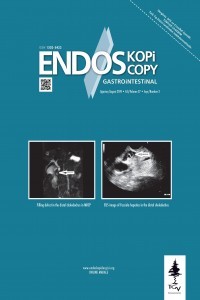PET incelemede insidental saptanan fokal kolon tutulumu olgularımız
Pozitron emisyon tomografi, florodeoksiglikoz, polip
Incidentally detected focal colonic involvement in our cases with PET scan
Positron emission tomography, fluorodeoxyglucose, polyp,
___
- Bomanji JB, Costa DC, Ell PJ. Clinical role of positron emission tomog- raphy in oncology. Lancet Oncol. 2001;2:157-64.
- Macbeth RA, Bekesi JG. Oxygen consumption and anaerobic glycolysis of human malignant and normal tissue. Cancer Res 1962;22:244-8.
- Chen YK, Kao CH, Liao AC, et al. Colorectal cancer screening in asymp- tomatic adults: the role of FDG PET scan. Anticancer Res 2003;23:4357- 61.
- Roh SH, Jung SA, Kim SE, et al. The clinical meaning of benign colon uptake in 18 F-FDG PET: Comparison with colonoscopic findings. Clin Endos. 2012;45:145-50.
- Lee JC, Hartnett GF, Hughes BG, et al. The segmental distribution and clinical significance of colorectal fluorodeoxyglucose uptake incidentally detected on PET-CT. Nucl Med Commun 2009;30:333-7.
- Peng J, He Y, Xu J, et al. Detection of incidental colorectal tumours with 18F-labelled 2-fluoro-2-deoxyglucose positron emission tomography/ computed tomography scans: results of a prospective study. Colorectal Dis 2011;13:e374-8.
- Shim JH, O JH, Oh SI, et al. Clinical significance of incidental colonic 18F-FDG uptake on PET/CT images in patients with gastric adenocarci- noma. J Gastrointest Surg 2012;16:1847-53.
- Zhuang H, Hickeson M, Chacko TK, et al. Incidental detection of colon cancer by FDG positron emission tomography in patients examined for pulmonary nodules. Clin Nucl Med 2002;27:628-32.
- Yasuda S, Ide M, Takagi S, et al. F-18 FDG uptake in colonic adenoma. Clin Nucl Med 1998;23:99-100.
- Drenth JP, Nagengast FM, Oyen WJ. Evaluation of (pre-)malignant co- lonic abnormalities: endoscopic validation of FDG-PET findings. Eur J Nucl Med 2001;28:1766-9.
- van Kouwen MC, Nagengast FM, Jansen JB, et al. 2-(18F)-fluoro-2-de- oxy-D-glucose positron emission tomography detects clinical relevant ad- enomas of the colon: A prospective study. J Clin Oncol 2005;23:3713-7.
- Bakheet SM, Saleem M, Powe J, et al. F-18 fluorodeoxyglucose chest up- take in lung inflammation and infection. Clin Nucl Med 2000;25:273-8.
- Yasuda S, Fujii H, Nakahara T, et al. 18F-FDG PET detection of colonic adenomas. J Nucl Med 2001;42:989-92.
- Treglia G, Calcagni ML, Rufini V, et al. Clinical significance of incidental focal colorectal (18)F-fluorodeoxyglucose uptake: our experience and a review of the literature. Colorectal Dis 2012;14:174-80.
- Yasuda S, Takahashi W, Takagi S, et al. Factors influencing physiological FDG uptake in the intestine. Tokai J Exp Clin Med 1998;23:241-4.
- ISSN: 1302-5422
- Başlangıç: 2010
- Yayıncı: Türk Gastroenteroloji Vakfı
Mesut SEZİKLİ, Züleyha Akkan ÇETİNKAYA, Göktuğ ŞİRİN, Fatih GÜZELBULUT, Galip Egemen ATAR, Didem EROĞLU, Emre DÖNMEZ
Sfinkterotomi sonrası kanama tedavisinde tam kaplı metal stent: Olgu sunumu
Muhammet Yener AKPINAR, Serkan TORUN, Erkin ÖZTAŞ, Bülent ÖDEMİŞ
Ahmet UYANIKOĞLU, Timuçin AYDOĞAN, Haşim NAR, Rıza ALTUNBAŞ, Necati YENİCE
Veli ÇAKICI, Elif YORULMAZ, Hasan Hüseyin MUTLU, Celal ULAŞOĞLU, Mehmet ÇELİK, İlyas TUNCER, Hilmi ÇİFTCİ, Gözde Derviş HAKİM, Hacer Hicran BEYCA, Ebubekir ŞENATEŞ
Demir eksikliği anemisi olan hastalarda alt ve üst gastrointestinal endoskopik inceleme sonuçları
Yıldız OKUTURLAR, Aliye SOYLU, Yeşim İNAN, Ömer ŞEKER, Kamala GANJALİYEVA, Serdal ÇAKMAK, Buğra ÖZTOSUN, Özlem HARMANKAYA, A. Baki KUMBASAR
PET incelemede insidental saptanan fokal kolon tutulumu olgularımız
Serdal ÇAKMAK, Aliye SOYLU, İsa SEVİNDİR, Yıldız OKUTURLAR, Mustafa UÇAR
Koledok kistlerinden kaynaklanan kolanjiokarsinom: Olgu Sunumları
Gülten Can SEZGİN, Alper YURCİ, Eylem SEVİNÇ, Kemal DENİZ, Derya KARADEMİR, Zeki YILMAZ
Nazobiliyer drenaja bağlı akut böbrek yetmezliği gelişebilir mi?
Erkin ÖZTAŞ, Nuretdin SUNA, Ufuk Barış KUZU, Orhan ÇOŞKUN, Bülent ÖDEMİŞ, Selçuk DİŞİBEYAZ, Ertuğrul KAYAÇETİN
